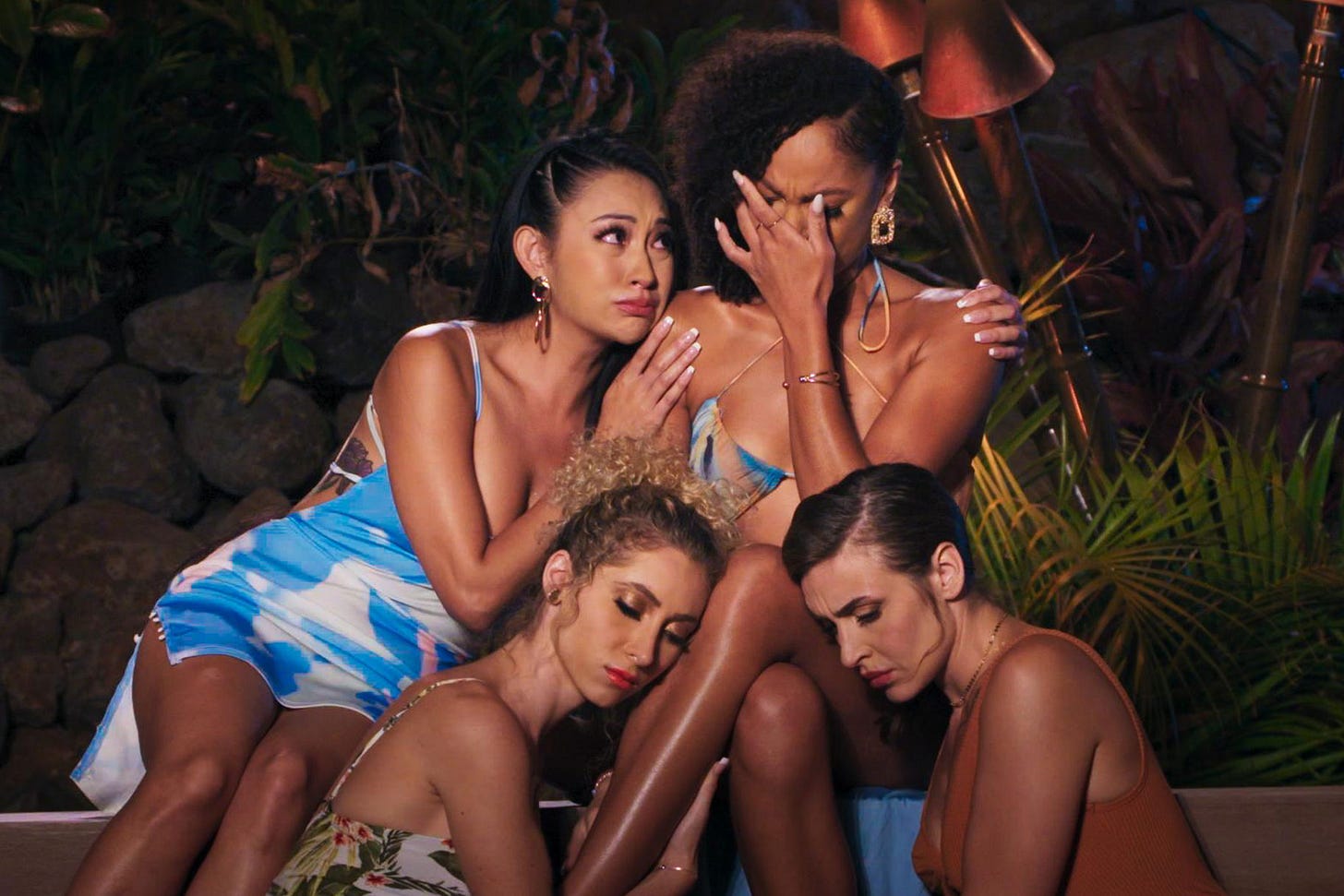I used to watch The Bachelor, but I had to stop when I realized I could no longer buy into the show’s version of ‘good’ and ‘evil.’ In order to enjoy a show like The Bachelor, you must believe that some of the contestants, the ones who are there for the ‘right reasons,’ are deserving of love, while others are not. Even the canny viewer, wise to the ways in which the show’s producers manipulate the events depicted, must believe this on some level, because watching the show’s heroes and villains clash with one another is one of the best things about it.
I’m not sure when it happened, but once I lost the ability to emotionally invest in this distinction, the show lost all appeal for me. All of the people on this show are awful, I would think, because they all wanted to be on this show. No one who pursues fame this shamelessly deserves love. They don’t even deserve a second career selling vitamins on Instagram. They deserve to suffer.
I know that this may sound extreme, but you have to understand that the people on The Bachelor are really, really annoying, a trait they share with the majority of reality show contestants. This is no accident, of course – the annoying people who appear on reality shows are selected for the cast because they’re annoying. In many forms of entertainment, being annoying is a huge disadvantage and can often negatively impact viewer enjoyment, but the rules are different on reality TV. Reality TV – particularly dating-based reality shows – are a form of socially-acceptable public humiliation inflicted on consenting adults. This can be incredibly satisfying to watch, especially when the contestants are annoying. And for some of us, all of them are annoying. Temptation Island is for us.
Temptation Island is a show about hell. It’s a show about people in pursuit of self-knowledge who end up damning themselves to hell to be tortured by Mark Walberg – that’s Mark Walberg, no ‘h.’ It’s a show about forcing yourself to endure a devastating psychosexual carnival ride in full view of the entire world just so you can get your numbers up on Instagram. It’s also a show about the sexual practice of cuckoldry, but I’m getting ahead of myself.
Temptation Island initially ran for three seasons on Fox from 2001-2003. It provided fodder for a lot of leering, bewildered jokes on late-night talk shows, but people also seemed genuinely shocked and lightly outraged by the show’s premise. This is probably because the show debuted at an awkward time for reality TV, just six months after Survivor but a year before The Bachelor. Americans didn’t really know how to process this sort of stuff yet. If Temptation Island had debuted on VH1 five years later, it would’ve done a lot better – debuting when it did, on a major network during the first George W. Bush administration, it seemed less like trashy fun and more like an assault on traditional morality.
The official premise of the show is this: four couples arrive at the titular island (typically embodied by a tropical resort) and split up. The men from each couple live together in a house with a bunch of single women, while the women from each couple live together in a house with a bunch of single men. The idea is that the couples will individually face temptation from these “sexy singles” and either succumb to it, presumably ending their relationship, or stoically endure it and continue on with their original relationship intact. Some contestants will even propose to their significant other at the end of the season, and sometimes their significant other actually says yes. Seriously! How fucked up is that? I mean, what are you gonna tell people? That you got engaged on Temptation Island? What the fuck is wrong with you?
The reality of the situation is that these people have willingly stepped into a massive Rube Goldberg-style machine that has been precisely engineered to inflict emotional agony. Think about it: you travel to a foreign country with your partner. You spend one night together, sharing a romantic dinner and reflecting on your relationship. Next, two dozen sexy singles are paraded out in front of you, and immediately after that, you are separated from your partner and taken to a strange house full of unfamiliar people, a situation not unlike the ones that prospective cult members are forced to endure.
It is in this villa that you will begin your new life of suffering. You have nothing to do for entertainment but exercise and drink. You are fed sparsely but the alcohol flows twenty-four hours a day. You are directed to participate in mandatory themed parties that usually involve taking your clothes off and dancing with strangers but always involve copious amounts of alcohol. Then, every couple of days, in between having tequila funneled down your throat, you are dragged out to a bonfire where you and your fellow contestants are forced to watch footage of your partner's actions in the other villa, all of it edited for maximum incrimination and maximum pain. Then you go home, get drunk, and do it all again.
This might sound bleak, and the idea of enjoying it might even seem a bit “mean-spirited” – but reality television as a genre is built on this kind of suffering. The promise of The Bachelor and other dating show is that the viewer will see the contestants experience heartbreak, hear them sobbing and watch the tears roll down their face as the camera pushes in closer and closer. And it’s supposed to be real, right? Even if part of us knows it’s an illusion, the other part of us, the much louder part that actively enjoys these shows, wants it to be real, and that means that we want the suffering to be real, too. We can say that those aren’t the parts of the show we like, but we know we’re going to see them, right? We wouldn’t watch the show if we didn’t. The only difference with Temptation Island is that it's honest about it, and it forces the viewer to be honest, too.
Like any good conception of hell, this one doles out different degrees of punishment to its inhabitants based on the degree of sin they’ve committed – as Meek Mill once observed, there’s levels to this shit. Everyone on Temptation Island deserves to suffer, but some people deserve it more than others, and boy, do they get it. A perfect example of this is Hania from Season 7, who initially presents as a relatively normal boyfriend before drunkenly revealing that he’s cheated on his girlfriend Ash multiple times over the span of their eighteen-month(!) relationship.
Even worse, when Ash is shown the footage of this confession, she breaks down crying, not because of the betrayal, but because she’s so relieved to finally have proof that Hania has been lying to her for their entire relationship. When this happens, I swear that you can see a fire lighting behind Mark Walberg’s eyes as all of his infernal machines spring to life for the sole purpose of tearing Hania’s soul into shreds.
And, because Temptation Island is a show that delivers on its promise, we then get to watch Hania suffer for his misdeeds for the rest of the season. He staggers around the house in bleary-eyed emotional torment, breaks down crying whenever someone tries to talk to him, and ultimately decides that the problem is that he hasn’t been committed enough. At this point, he buys an engagement ring and when he sees Ash for the first time in weeks – I told you that they did this – he proposes to her and gets mercilessly shot down on the spot. It’s beautiful, transcendent television.
Of course, there are always people who think they can game the system. As I alluded to earlier, there are numerous couples – about one per season – that appear, through their attitude and behavior, to not be playing the same game as the other contestants. They don’t seem as emotionally invested in the fate of their relationship, and the idea of their partner succumbing to temptation doesn’t seem to bother them. There have been a lot of different names for this type of person over the years, but for simplicity’s sake, let’s call them swingers – people who are actively seeking a sexual relationship for themself or their partner (or both!) for the purposes of their mutual gratification. I have no philosophical opposition to these people, but they are marked as my enemy by their blatant attempts to subvert the unimpeachable goals of this holy show.
Fortunately, the fallen angels that run Temptation Island are on the case. Season 8 began last week, and while the show’s basic format is unchanged (so far), there are a number of interesting twists. Now, instead of a private dinner on their first night, the contestants are immediately whisked away to a bonfire, which usually doesn’t happen until after they’ve been split up. Once they are there, Mark Walberg begins asking them extremely loaded questions about their relationship that seem scientifically optimized to stir up shit and start arguments. This means that anyone looking to indulge in a cucking fantasy (or some variation thereof) is forced to explain and justify their presence on the show, which inevitably dredges up some actual emotions. There’s one couple that I’ve already marked down as this season’s swingers, and their squirming reaction to Mark’s questions has already got me excited. Perhaps this will be the first season where one of these people is forced to admit to what they’re doing – but by then, it will be too late. Much, much too late.
After the surprise bonfire, the contestants meet the singles in the usual dehumanizing way, but afterwards, they are all herded into one of the villas for a big, opening-night party, where the contestants and the singles all mingle and interact in a way that we’ve never seen before. This means that anyone who is even a little bit jealous now gets the chance to watch their partner flirting with members of the opposite sex, many of whom have been cast to play on their specific physical insecurities. Before, contestants were haunted by the vague idea that their partner might be cheating on them, but now they have a very specific mental picture with which to torture themselves. It rules.
The villainy of this is compounded by another twist, which is announced in the show’s opening moments but has yet to officially debut. Around the villa, already visible during the party sequence, are a number of white spheres, roughly the size of a basketball. As explained by voiceover, when someone at the other villa succumbs to temptation, the spheres will glow with a bright red light – but, crucially, they will not reveal who has transgressed, so everyone is free to let their paranoia run wild.
No longer satisfied with mere emotional torture, the producers of Temptation Island have devised a way to turn the contestant’s own minds against them. Only time will tell if these diabolical psychological devices will pay narrative dividends, but I intend to be there every week to find out. I invite you to join me, if you’re ready to face the truth.







